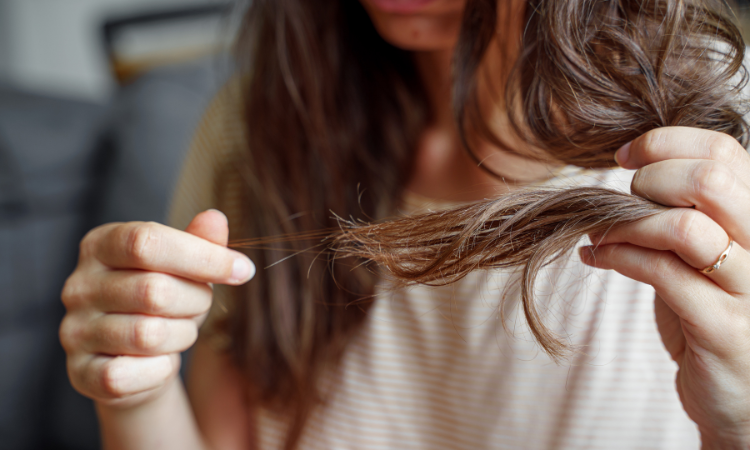Hair is an essential part of our identity and appearance. When we start to notice that it falls out more than usual, it is normal for us to worry. Throughout the year, it is common to notice variations in the amount of hair we lose, but when does hair really fall out the most?
In this blog post by Arandovo, we will take a look at what time of the year we experience more hair loss, the most common causes of this phenomenon, how stress plays a role in this and, of course, how we can prevent it.

Most common causes of hair loss
Before we dive into the question of when hair falls out the most, it is crucial to understand the causes behind hair loss. There are several possible reasons regarding this concern:
Genetic factors
Genetics play an important role in hair health. If you have a family record of baldness, you may be genetically predisposed to hair loss at certain times in your life.
Hormonal changes
Hormonal changes can trigger hair loss. This includes events such as pregnancy, childbirth, menopause and contraceptive intake. Hormonal imbalances can affect the hair growth phase, resulting in increased hair loss.
Health problems
Diseases such as thyroid, lupus and diabetes can contribute to hair loss. It is also common to see increased hair loss in people undergoing medical treatments such as chemotherapy.
Stress
Stress is a significant cause of hair loss, and we will address this further in a later section.
Poor nutrition
A diet low in essential nutrients, such as protein, vitamins and minerals, can weaken hair and lead to further hair loss.
Aggressive hair treatments
Excessive use of chemicals and constant heat on the hair (through blow-drying or straightening, for example) can damage hair follicles and cause hair loss.
In which months does hair fall out the most
Now that we know some of the causes of hair loss, let’s take a look at when hair falls out the most throughout the year. In this case the answer may vary from person to person and geographic location, but there are some general trends we can identify.
Fall: the season of hair loss
Fall is the time when most hair loss is experienced, according to many people. This phenomenon is known as “seasonal telogen effluvium” and is quite common. During summer, our hair tends to be in its most active growth phase (called the anagen phase). When fall arrives, more hair enters the resting (telogen) phase, resulting in more hair loss. This seasonal shedding is usually temporary and hair usually recovers as we move into winter.
Winter and Spring: the transition
Winter and spring can be a transitional period for our hair. After the seasonal fall shedding, hair follicles grow back and prepare for the summer season, when they will be back in their most active growth phase.
Summer: the hair growth boom
Summer is usually the time when our hair is at its best. Longer days and more sun exposure can stimulate hair growth and improve scalp health. However, it is also important to take precautions to protect hair from sun damage and chlorine from swimming pools.
Stress-related hair loss
Stress is a factor that deserves special attention when it comes to hair loss. Chronic stress can have a significant impact on hair health. When we are stressed, our body releases hormones such as cortisol, which can negatively affect hair follicles and lead to hair loss.
In addition, stress can trigger habits such as scalp scratching or hair pulling, which further aggravates the problem.
To avoid stress-induced hair loss, it is essential to find effective ways to manage it. Some strategies include meditation, regular exercise, yoga, quality time with friends and family, and check-ups with a mental health professional if necessary.
How to prevent hair loss
In order to prevent hair loss and maintain a healthy mane, it is essential to take a holistic approach, from nutrition to hair care. Here are some of the best tricks to prevent hair loss and keep your hair strong and shiny:
Balanced diet
Maintaining a diet rich in protein, iron, biotin, and vitamins A, C, and E provides the nutrients needed to strengthen hair from within.
Gentle hair care
Avoid excessive use of chemicals and heat exposure. Wash and condition your hair with suitable products according to your hair type.
Stress management
Practicing relaxation techniques, such as meditation or yoga, can reduce the negative impact of stress on your hair.
Smooth brushing
Use a soft bristle brush and avoid excessive brushing, especially when hair is wet and vulnerable.
Avoid excessive use of heat
The use of heat tools such as straighteners or blow-dryers can cause the scalp to weaken. The important thing is to make sure you use heat protectants to minimize damage.
Consult a professional
If hair loss is significant or worrisome, seek the guidance of a dermatologist or hair health specialist.
Natural food supplements to stop hair loss
Natural food supplements are among the most effective strategies to stop hair loss. These supplements can be used to support diet and provide additional nutrients that are not present in sufficient quantities within our daily food.
In this context, Arandovo has developed MKARE, a 100% natural functional ingredient based on egg membrane and natively containing a unique source of bioactive compounds with multiple health benefits.
MKARE is rich in elastin, glucosamine, hyaluronic acid, collagen (I,V and X) and over 400 proteins, making it the perfect supplement to nourish the hair from the inside, providing strength and thickness to it, while improving its growth and preventing hair loss.
It is important to note that hair loss is a phenomenon that may change throughout the year and, as mentioned above, can be influenced by different factors. In addition, the causes of hair loss can be diverse, from genetic factors to health problems and, especially, stress.
To maintain a healthy hair and avoid excessive hair loss, it is essential to take proper care of your hair and pay attention to the signals your body is sending you. Good nutrition, stress management, choosing the right hair products and natural food supplements can make a huge difference for the health of your hair.
Make sure to choose quality supplements and check with a health professional before adding them into your routine to ensure they are right for you.
Check out our website now to learn more about the benefits of taking MKARE. And if you happen to need more information do not hesitate to contact us, we will be happy to assist you.




